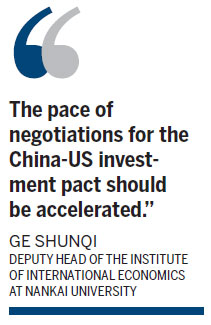China, US investment talks called top priority
Updated: 2014-02-12 07:07
By Li Jiabao (China Daily)
|
||||||||
Bilateral treaty an 'important' opportunity
China and the United States should accelerate talks on a bilateral investment treaty and finalize the pact this year to unleash investment potential, experts said.

"Finalizing a meaningful BIT should be a top priority for both governments in 2014," said the US-China Business Council Board of Directors' Statement of Priorities in the US-China Commercial Relationship.
Reuters quoted the head of the council's board, John Frisbie, as saying on Monday that "it's very important for us to grasp this opportunity to try to move forward and see how serious they are".
China and the US began discussing the treaty in 2008, but talks stalled with China's insistence on a long list of protections for some sectors.
Officials of the world's two biggest economies agreed in July to restart negotiations for a pact that incorporates national treatment for both new and existing investments.
The pact will also have a "negative list" covering all investments except those specifically excluded.
The 11th Sino-US Round of Negotiations for the treaty was held in Shanghai from Jan 14-15. The negotiators agreed on procedures and methods for future discussions.
"It is important for China to take proactive steps to reduce investment barriers in the near term, even while the two sides are negotiating a BIT. Reducing ownership restrictions upfront and demonstrating a commitment to treat domestic and foreign investors equally will build strong support in the United States for a BIT," said the USCBC statement.
Li Guanghui, vice-president of the Chinese Academy of International Trade and Economic Cooperation (a think tank of the Ministry of Commerce), said: "It's possible to conclude the talks before the end of this year. But that's not for sure.
"The major challenge is that China is uncertain about the consequences from the 'negative list' or the results from opening the restricted sectors," Li added.
The USCBC statement said that China maintains foreign ownership restrictions in nearly 100 manufacturing and service sector categories.
Most Viewed
Editor's Picks

|

|

|

|

|

|
Today's Top News
Wine critic to start world tour in Beijing
China sends contingent to US-Thailand drill
Tokyo unveils armed forces reforms
Old palace columns coming home
Liaison mechanism to link Straits
Kerry seeks to 'rule out' possibility of conflict
Official cars to be auctioned in NE China city
Joint operation ensnares poachers
US Weekly

|

|












